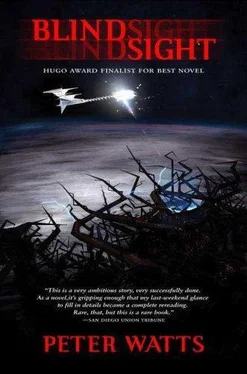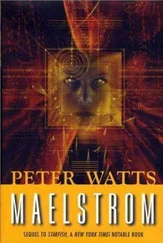Everyone else did. How else would you explain 65,536 probes evenly dispersed along a lat-long grid that barely left any square meter of planetary surface unexposed? Obviously the Flies had taken our picture. The whole world had been caught with its pants down in panoramic composite freeze-frame. We’d been surveyed — whether as a prelude to formal introductions or outright invasion was anyone’s guess.
My father might have known someone who might have known. But by then he’d long since disappeared, as he always did during times of hemispheric crisis. Whatever he knew or didn’t, he left me to find my own answers with everyone else.
There was no shortage of perspectives. The noosphere seethed with scenarios ranging from utopian to apocalyptic. The Fireflies had seeded lethal germs through the jet stream. The Fireflies had been on a nature safari. The Icarus Array was being retooled to power a doomsday weapon against the aliens. The Icarus Array had already been destroyed. We had decades to react; anything from another solar system would have to obey the lightspeed limit like everyone else. We had days to live; organic warships had just crossed the asteroid belt and would be fumigating the planet within a week.
Like everyone else, I bore witness to lurid speculations and talking heads. I visited blathernodes, soaked myself in other people’s opinions. That was nothing new, as far as it went; I’d spent my whole life as a sort of alien ethologist in my own right, watching the world behave, gleaning patterns and protocols, learning the rules that allowed me to infiltrate human society. It had always worked before. Somehow, though, the presence of real aliens had changed the dynamics of the equation. Mere observation didn’t satisfy any more. It was as though the presence of this new outgroup had forced me back into the clade whether I liked it or not; the distance between myself and the world suddenly seemed forced and faintly ridiculous.
Yet I couldn’t, for my life, figure out how to let it go.
Chelsea had always said that telepresence emptied the Humanity from Human interaction. “They say it’s indistinguishable,” she told me once, “just like having your family right there, snuggled up so you can see them and feel them and smell them next to you. But it’s not. It’s just shadows on the cave wall. I mean, sure, the shadows come in three-dee color with force-feedback tactile interactivity. They’re good enough to fool the civilized brain. But your gut knows those aren’t people , even if it can’t put its finger on how it knows. They just don’t feel real. Know what I mean?”
I didn’t. Back then I’d had no clue what she was talking about. But now we were all cavemen again, huddling beneath some overhang while lightning split the heavens and vast formless monsters, barely glimpsed in bright strobe-frozen instants, roared and clashed in the darkness on all sides. There was no comfort in solitude. You couldn’t get it from interactive shadows. You needed someone real at your side, someone to hold on to, someone to share your airspace along with your fear and hope and uncertainty.
I imagined the presence of companions who wouldn’t vanish the moment I unplugged. But Chelsea was gone, and Pag in her wake. The few others I could have called — peers and former clients with whom my impersonations of rapport had been especially convincing — didn’t seem worth the effort. Flesh and blood had its own relationship to reality: necessary, but not sufficient.
Watching the world from a distance, it occurred to me at last: I knew exactly what Chelsea had meant, with her Luddite ramblings about desaturated Humanity and the colorless interactions of virtual space. I’d known all along.
I’d just never been able to see how it was any different from real life.
* * *
Imagine you are a machine.
Yes, I know. But imagine you’re a different kind of machine, one built from metal and plastic and designed not by blind, haphazard natural selection but by engineers and astrophysicists with their eyes fixed firmly on specific goals. Imagine that your purpose is not to replicate, or even to survive, but to gather information.
I can imagine that easily. It is in fact a much simpler impersonation than the kind I’m usually called on to perform.
I coast through the abyss on the colder side of Neptune’s orbit. Most of the time I exist only as an absence, to any observer on the visible spectrum: a moving, asymmetrical silhouette blocking the stars. But occasionally, during my slow endless spin, I glint with dim hints of reflected starlight. If you catch me in those moments you might infer something of my true nature: a segmented creature with foil skin, bristling with joints and dishes and spindly antennae. Here and there a whisper of accumulated frost clings to a joint or seam, some frozen wisp of gas encountered in Jupiter space perhaps. Elsewhere I carry the microscopic corpses of Earthly bacteria who thrived with carefree abandon on the skins of space stations or the benign lunar surface — but who had gone to crystal at only half my present distance from the sun. Now, a breath away from Absolute Zero, they might shatter at a photon’s touch.
My heart is warm, at least. A tiny nuclear fire burns in my thorax, leaves me indifferent to the cold outside. It won’t go out for a thousand years, barring some catastrophic accident; for a thousand years, I will listen for faint voices from Mission Control and do everything they tell me to. So far they have told me to study comets. Every instruction I have ever received has been a precise and unambiguous elaboration on that one overriding reason for my existence.
Which is why these latest instructions are so puzzling, for they make no sense at all. The frequency is wrong. The signal strength is wrong. I cannot even understand the handshaking protocols. I request clarification.
The response arrives almost a thousand minutes later, and it is an unprecedented mix of orders and requests for information. I answer as best I can: yes, this is the bearing at which signal strength was greatest. No, it is not the usual bearing for Mission Control. Yes, I can retransmit: here it is, all over again. Yes, I will go into standby mode.
I await further instructions. They arrive 839 minutes later, and they tell me to stop studying comets immediately.
I am to commence a controlled precessive tumble that sweeps my antennae through consecutive 5°-arc increments along all three axes, with a period of 94 seconds. Upon encountering any transmission resembling the one which confused me, I am to fix upon the bearing of maximal signal strength and derive a series of parameter values. I am also instructed to retransmit the signal to Mission Control.
I do as I’m told. For a long time I hear nothing, but I am infinitely patient and incapable of boredom. Eventually a fleeting, familiar signal brushes against my afferent array. I reacquire and track it to source, which I am well-equipped to describe: a trans-Neptunian comet in the Kuiper Belt, approximately two hundred kilometers in diameter. It is sweeping a 21-cm tightbeam radio wave across the heavens with a periodicity of 4.57 seconds. This beam does not intersect Mission Control’s coordinates at any point. It appears to be directed at a different target entirely.
It takes much longer than usual for Mission Control to respond to this information. When it does, it tells me to change course. Mission Control informs me that henceforth my new destination is to be referred to as Burns-Caulfield . Given current fuel and inertial constraints I will not reach it in less than thirty-nine years.
I am to watch nothing else in the meantime.
* * *
I’d been liaising for a team at the Kurzweil Institute, a fractured group of cutting-edge savants convinced they were on the verge of solving the quantum-glial paradox. That particular log-jam had stalled AI for decades; once broken, the experts promised we’d be eighteen months away from the first personality upload and only two years from reliable Human-consciousness emulation in a software environment. It would spell the end of corporeal history, usher in a Singularity that had been waiting impatiently in the wings for nigh on fifty years.
Читать дальше









